World News Daily(2024-07-28) : Kamala Harris's Historic Ascent in US Politics
Kamala Harris's Historic Ascent in US Politics

Kamala Harris stepped into the spotlight as the Democratic nominee for president, following Joe Biden's withdrawal. Her ascent marked a pivotal shift in US politics, symbolizing a generational handoff.
Biden's endorsement, coupled with support from key Democratic figures like Barack Obama and Hillary Clinton, solidified her position. Harris's campaign quickly mobilized, leveraging Biden's campaign resources and a substantial war chest.
Her message focused on moving forward, contrasting with Trump's past policies. Harris addressed diverse audiences, from historically Black sororities to teachers, emphasizing opportunity and progress.
Internationally, she met with Israel's prime minister, Benjamin Netanyahu, and addressed ongoing conflicts, promising a vocal stance on human rights.
Fundraising surged, setting records with over $81 million in a single day, highlighting grassroots support. The campaign's energy drew younger voters, a demographic notably absent in previous campaigns.
Harris's trajectory from vice-president to presidential nominee unfolded rapidly, capturing the nation's attention and setting the stage for a historic election.
ScoresPolitics
UK Launches New State-Owned Energy Company to Boost Wind Power
UK plans a major push for offshore wind. A new state-owned company, Great British Energy, is leading the initiative. It has received £8.3 billion from taxpayers. The goal is to achieve a zero-carbon grid by 2030. The company is partnering with the Crown Estate, which owns the UK seabed. They hope to attract private funds. Additionally, three new solar farms have been approved, and the ban on onshore wind has been lifted. Prime Minister Keir Starmer aims to win the clean energy race.
ScoresEU Plans to Use Frozen Russian Assets for Ukraine Aid

EU plans to use 1.5 billion euros from frozen Russian central bank assets to aid Ukraine's military and reconstruction. These assets, totaling about 210 billion euros, were frozen due to Russia's invasion of Ukraine. European Commission President Ursula von der Leyen views this as a fitting use of the funds. Russia threatens retaliation. Additionally, the Group of Seven aims to finalize a 50-billion-dollar loan to Ukraine using Russian assets by year's end.
ScoresMeasures for the Public Service Management of Online Identity Verification in China: Public Consultation
The Ministry of Public Security and the Cyberspace Administration of China have drafted the "National Network Identity Authentication Public Service Management Measures" and are soliciting public opinions. The measures aim to establish a national network identity authentication public service platform, issuing unified "Network IDs" and "Network Certificates" to facilitate public identity registration and verification in internet services while safeguarding personal information security.
"Network IDs" and "Network Certificates" allow users to authenticate their identities in a non-plaintext state, reducing the need for internet platforms to collect personal information. The measures emphasize the obligations of data and personal information protection and stipulate the legal responsibilities for violations of these obligations.
The public can submit suggestions on the draft through various channels, with feedback closing on August 25, 2024.
ScoresSociety
Bobby Jain's Innovative Fee Strategy Attracts $53 Billion in Hedge Fund Funding
Bobby Jain, a former top executive at Millennium, launched Jain Global, an ambitious hedge fund. Despite initial setbacks, Jain secured $53 billion in funding by slashing fees: no management fee, and carry fees ranging from 10-15%. This strategy, uncommon yet effective, mirrors trends in overseas markets where top firms like Tiger Global and Blackstone have also reduced fees to attract investors.
The traditional fee structure in venture capital and private equity, typically 2% management fee plus 20% carry, faces scrutiny. This model, inherited from the early days of firms like KKR, is now challenged by market realities and pressure from large investors.
In China, despite similar fundraising challenges, VC/PE firms have been reluctant to reduce fees. This reluctance stems from a reliance on management fees as a critical source of operational cash flow, especially in a climate of prolonged investment cycles and limited exit opportunities.
The article highlights a shift towards more flexible fee structures globally, driven by competitive pressures and the need for innovation in fundraising strategies.
ScoresDiscovery of New Ice Form 'Ice 0' Resolves Longstanding Scientific Debate
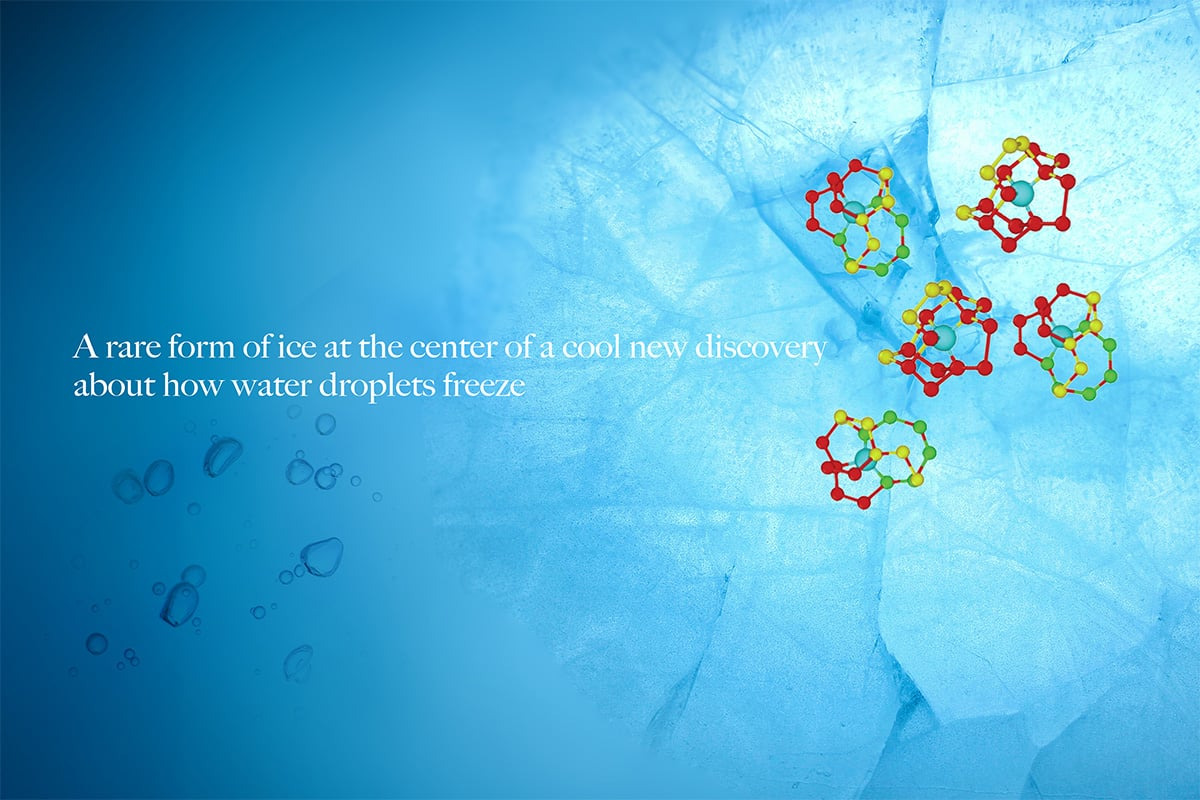
Japanese researchers have discovered a new form of ice, dubbed "Ice 0," which forms crystals in supercooled water. This discovery, detailed in Nature Communications, resolves a long-standing debate about where ice nucleates—at surfaces or within water.
Traditionally, ice nucleation occurs at the interface of liquid and solid. However, this study demonstrates that it can also take place below the water surface, near air. Ice 0 precursors, which have ring-like structures similar to Ice 0, facilitate this process.
These precursors form due to water's surface tension, creating a negative pressure. They quickly rearrange into common Ice I once crystallization begins.
The findings are significant. Understanding how ice forms can impact climate research and food science. It could also benefit meteorology, where Ice 0-like precursors might affect cloud droplets.
Overall, this research deepens our understanding of ice's complexity and its varied impacts across disciplines.
ScoresGeneticist Composes Scientific Choral Work

Jenny Graves, an evolutionary geneticist and choral singer, has created a 110-minute choral work titled "Origins of the Universe, of Life, of Species, of Humanity." This piece retells the story of creation through scientific discoveries, blending cosmology, molecular biology, and more. Graves, known for her bold and humorous approach, faced resistance but ultimately received a standing ovation in Melbourne.
Born in Adelaide, Graves initially disliked biology until a high school genetics lesson on budgerigars sparked her interest. She pursued genetics, studying sex-determining chromosomes in kangaroos and earning a Ph.D. at Berkeley. Graves later focused on comparative genomics, comparing genomes of various species to understand evolutionary patterns.
Her career highlights include challenging a key genetic theory and predicting the eventual disappearance of the human Y chromosome. Despite health challenges and gender bias in her field, Graves remained resilient, using music to engage students and colleagues.
Graves' work exemplifies the intersection of science and art, challenging traditional narratives with empirical evidence. Her journey from a disengaged student to a pioneering scientist underscores the transformative power of curiosity and persistence.
ScoresEconomy
CrowdStrike Failure Causes Global Economic Impact
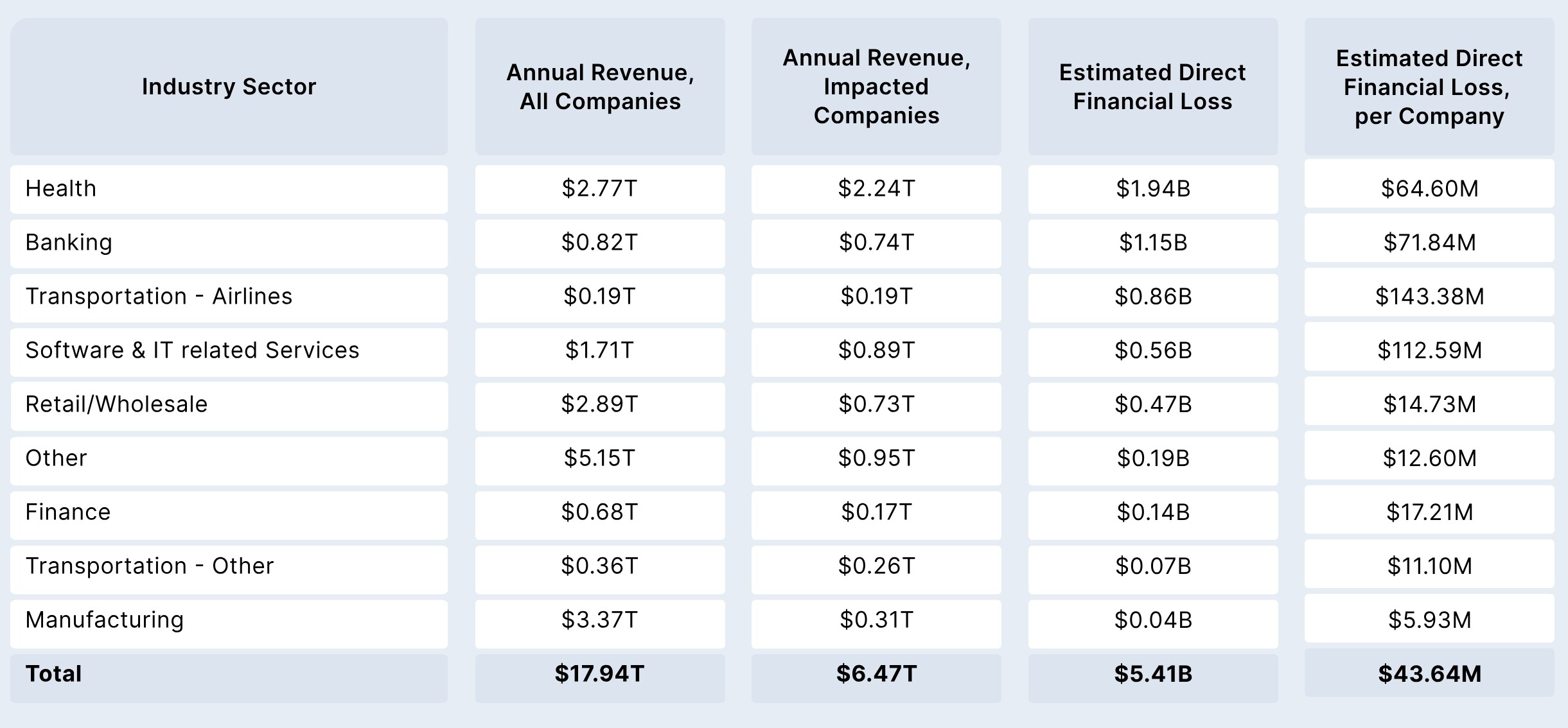
CrowdStrike's recent failure impacted 850,000 Windows devices, resulting in a global loss of $150 billion. Insurance, provided by Parametrix, covered only $15-$30 billion. The hardest-hit sectors were airlines and healthcare, with respective losses of $1.48 billion and $19.4 billion. Microsoft anticipates full recovery will take several weeks. CrowdStrike's CEO, George Kurtz, issued an apology for the disruption.
ScoresMarket Performance and Upcoming Earnings Reports Dominate Investor Focus
The market had a rough week, but Friday's rally eased some pain. The Dow and Russell 2000 outperformed, shifting focus from market favorites to underdogs. Health care, materials, and utilities sectors led gains; communication services and tech lagged.
Economic data showed stronger U.S. growth and steady inflation, supporting potential Federal Reserve rate cuts. Housing market weakness also hinted at rate reductions.
Earnings-wise, Danaher and Dover impressed, while Ford disappointed, seeing a 20% stock drop. Alphabet and Honeywell faced post-earnings sell-offs despite positive results.
Upcoming earnings from major companies like Microsoft, Apple, and Amazon will be crucial. Key points include Microsoft's Azure cloud growth and AI investments, Apple's guidance ahead of the iPhone 16 launch, and Amazon's logistics costs.
Overall, the market's performance and upcoming earnings reports will heavily influence investor sentiment and stock movements.
ScoresTesla's financial report is poor, and its market value has significantly declined. Is Elon Musk still trustworthy in the future?
Tesla's Q2 2024 financial report showed a 45% decline in net profit, with sales falling for two consecutive quarters year-over-year. Despite Elon Musk mentioning that FSD is expected to enter the Chinese and European markets, the stock price still plummeted by 12%, with the market capitalization evaporating by over $100 billion.
Tesla's vehicle gross margin dropped from 30% to 14.6%, primarily due to price wars and slow product iteration. In the Chinese market, prices for the Model 3 and Model Y were reduced, facing competition from domestically produced new cars in terms of comfort and intelligence.
Musk is pressuring the battery team to resolve technical issues with the 4680 battery to facilitate the mass production of new models. In the autonomous driving business, FSD technology is leading, but commercialization challenges are significant. The Robotaxi business has been postponed due to technical details and operational issues.
Tesla's challenge lies in balancing technological innovation with market competition, ensuring a leading position in new businesses such as autonomous driving. Musk's vision is to have Tesla owners participate in a shared Robotaxi model, but the realization is difficult.
ScoresRenowned short-seller Citron Capital and its founder face SEC charges, potentially facing up to 370 years in prison.
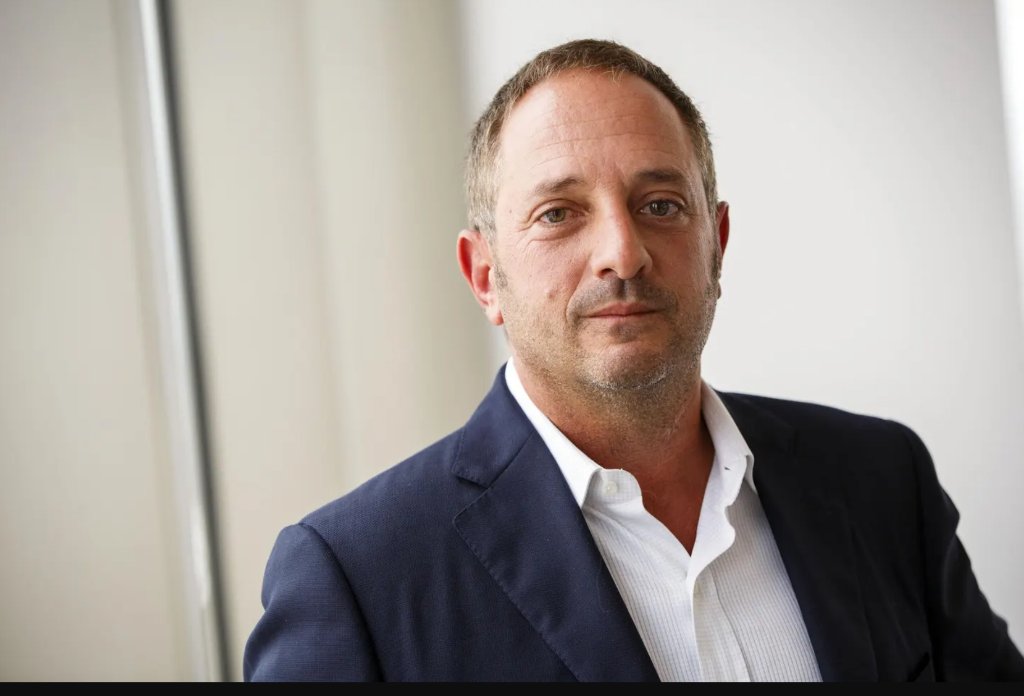
Andrew Left, a well-known short-seller on Wall Street, faces up to 370 years in prison for alleged securities fraud. The U.S. Securities and Exchange Commission (SEC) and the Department of Justice accuse Left and his company, Citron Capital, of disseminating misleading information to illegally profit by $20 million. Left is charged with 17 counts of securities fraud and making false statements.
The SEC alleges that Left used social media to recommend 26 times that investors short or go long on 23 companies, only to reverse his positions for profit. The Department of Justice also accuses Left of making false statements regarding hedge fund relationships and forging documents.
Citron Capital is known for shorting companies with overvalued stocks or suspected financial fraud. It has shorted several Chinese stocks, including Evergrande Real Estate and Longtop Financial Technologies. In 2021, Citron Capital suffered a major setback in the GameStop short battle, and Left announced he would no longer issue short reports, shifting focus to long strategies.
Left's attorney has not yet responded. The investigations by the SEC and the Department of Justice are ongoing.
ScoresTechnology
New Visible Light Method Fully Decomposes Harmful PFAS Chemicals
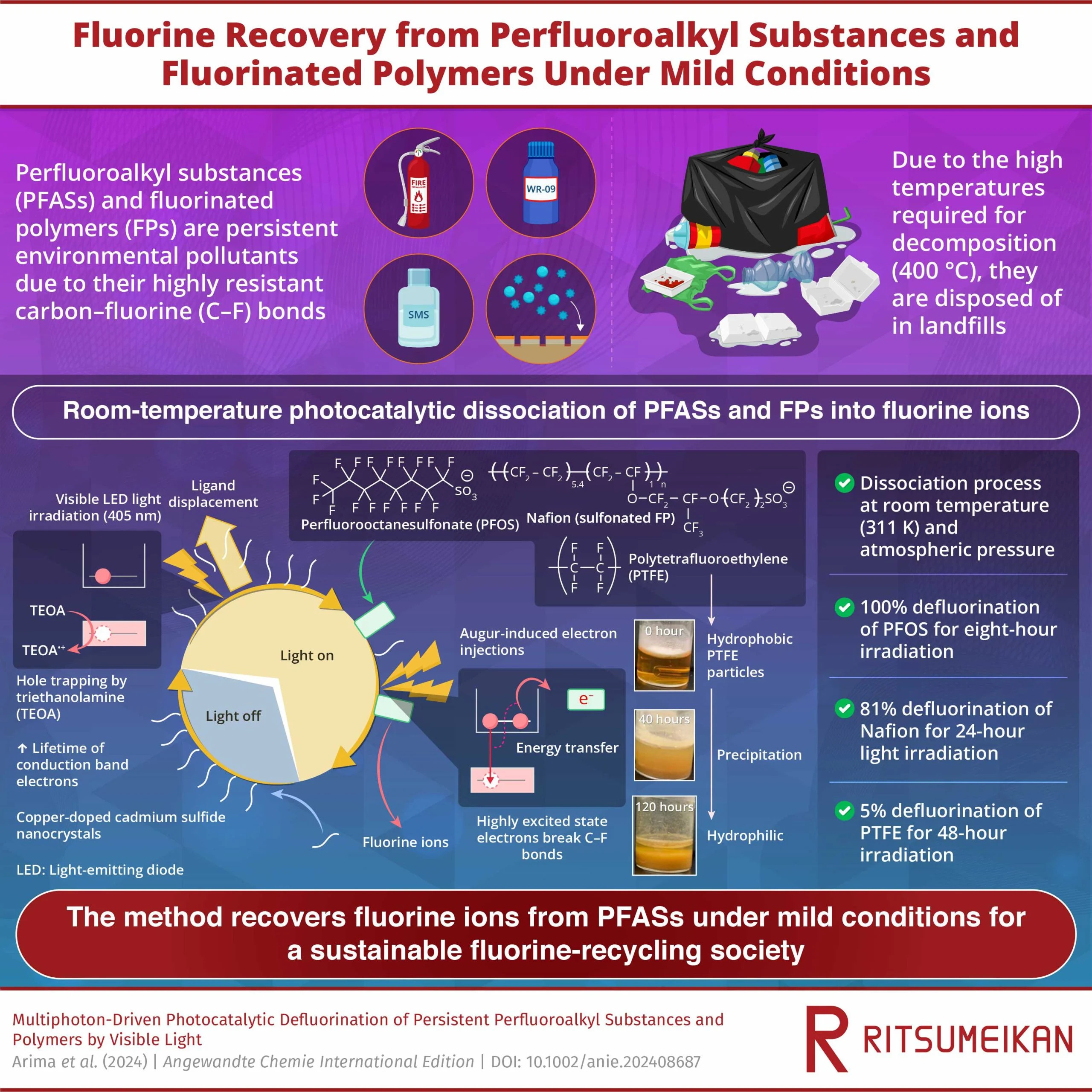
Researchers from Ritsumeikan University have developed a new method that utilizes visible light to completely decompose perfluorooctanesulfonic acid (PFAS) at room temperature, a harmful chemical substance commonly referred to as the "forever chemical." This method decomposes PFAS into fluoride ions within 8 hours, enabling sustainable recovery of fluorine.
PFAS, due to its stability, is widely used in products such as cookware, clothing, and firefighting foams. However, this stability makes it difficult to decompose in the environment, posing threats to health and the environment. Traditionally, PFAS requires temperatures above 400°C to decompose, making its treatment challenging.
The new method employs visible LED light to irradiate semiconductor nanocrystals, efficiently decomposing PFAS into fluoride ions through mechanisms involving photoinduced ligand displacement and Auger-induced electron injection. This method operates at room temperature, is easy to manage, and the defluorination efficiency increases with extended illumination time, achieving 100% defluorination within 8 hours.
This technology not only revolutionizes the treatment of PFAS but also promotes the recovery of fluorine, reducing reliance on new fluorine production, and making a significant contribution to establishing a sustainable fluorine recovery society.
ScoresNASA Pioneers Fungi-Based Habitat Construction for Lunar and Mars Missions
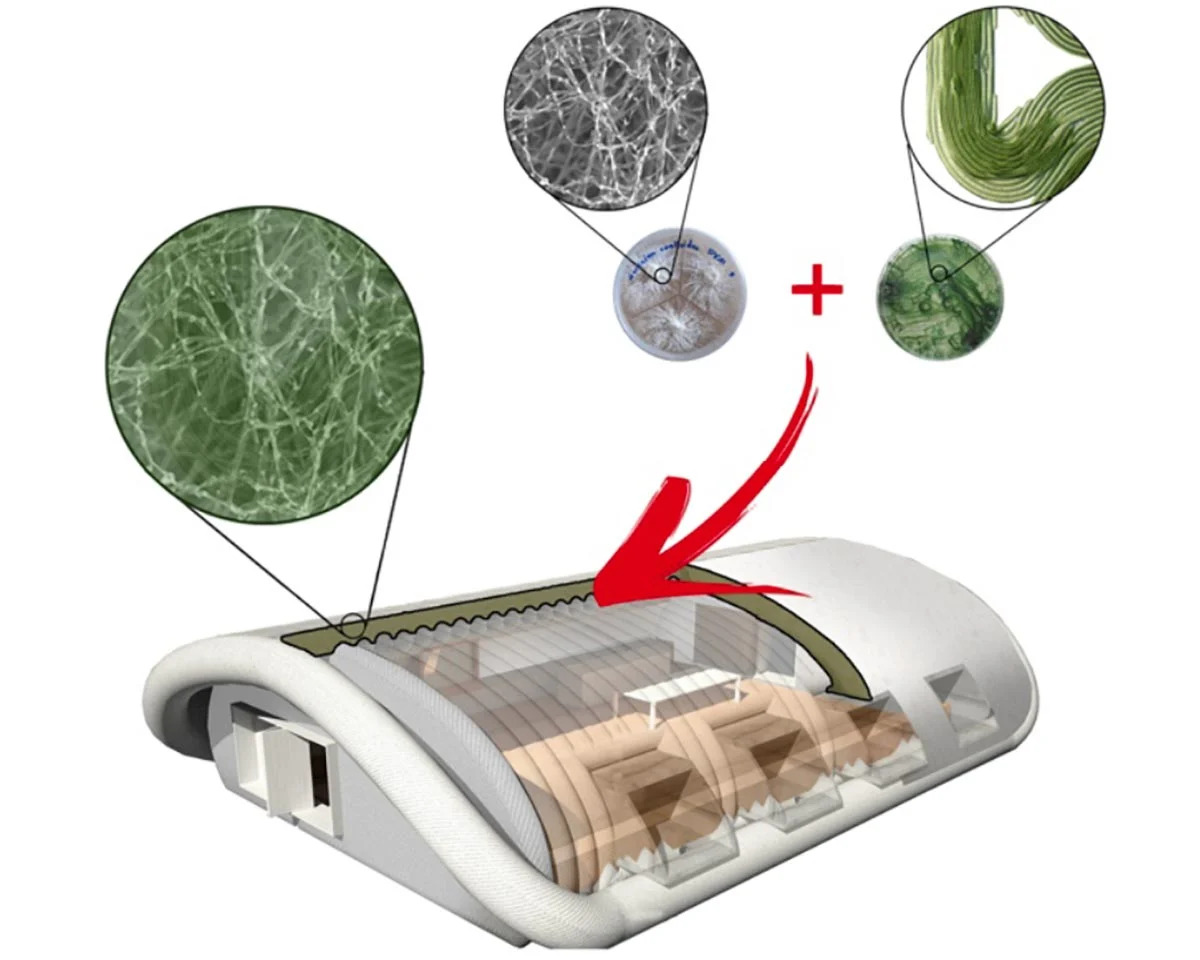
NASA's exploring fungi for lunar and Mars habitats. Funded with $2M, the Mycotecture Off Planet project aims to grow sustainable living spaces using mycelium—the underground network of fungi.
This tech could transform space construction. Lightweight, compact habitats, made with dormant fungi and other materials, could be transported to other planets. Once there, adding water activates the fungi, expanding the habitat into a usable structure.
Lynn Rothschild leads this research at NASA Ames. The project's not just for space; it could also benefit Earth, aiding in water filtration and waste management.
NASA's commitment to innovative tech like this underscores their mission to push boundaries in space exploration. The potential to build on the moon, then Mars, marks a significant step in human space habitation.
ScoresNASA's Roman Telescope to Study Dark Matter via Andromeda's Star Streams
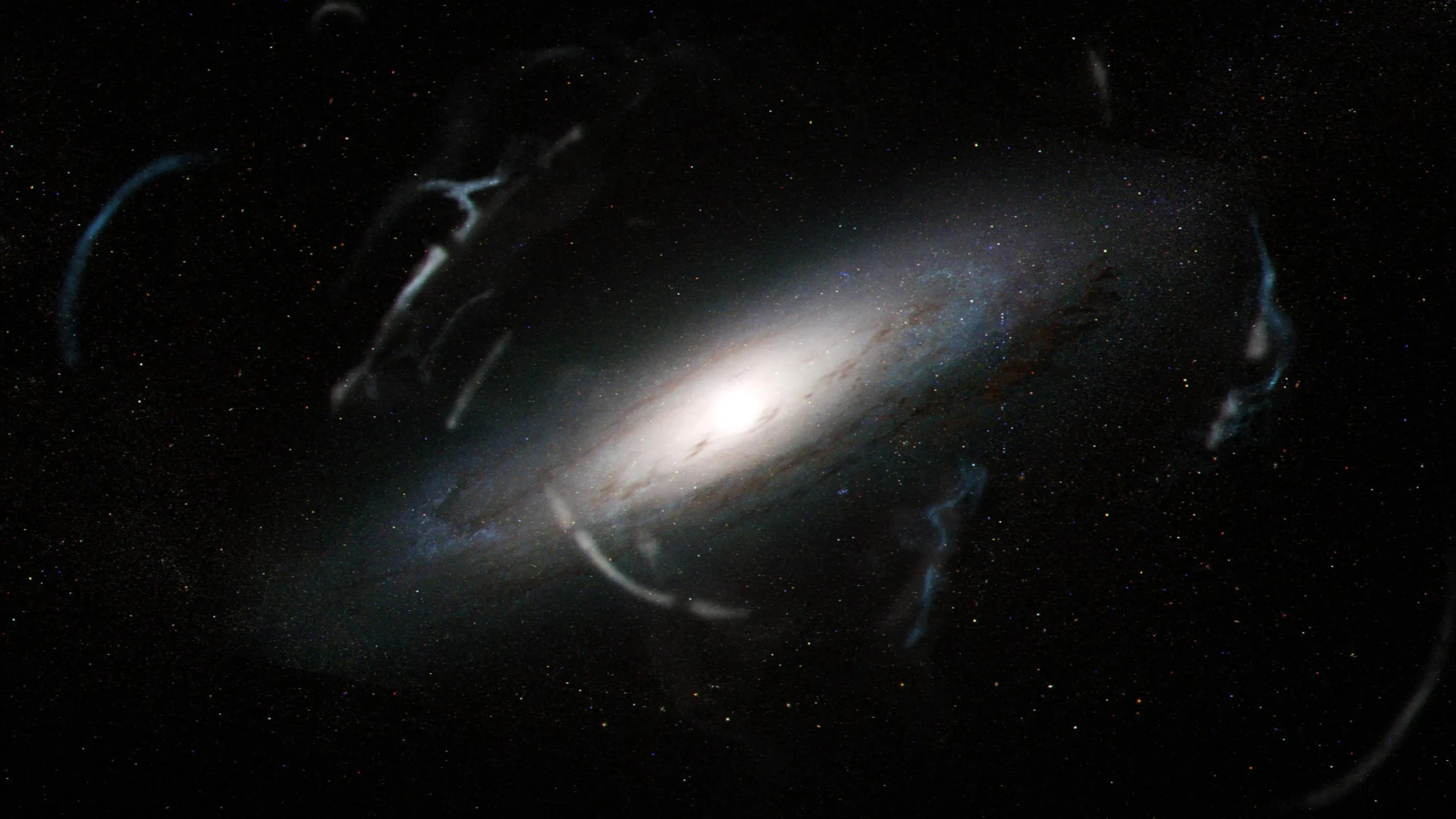
NASA's Nancy Grace Roman Space Telescope, set to launch by May 2027, aims to unveil dark matter by closely examining star streams in the Andromeda Galaxy. These streams, which are elongated groups of stars, sometimes show gaps that are likely caused by interactions with dark matter.
The Roman Telescope's superior imaging capabilities, which surpass those of the Hubble Space Telescope, will allow for detailed observations of these star streams. By analyzing the gaps within these streams, researchers hope to determine the properties of dark matter, a mysterious substance that affects galaxy rotation but does not emit or reflect light.
Christian Aganze and Tjitske Starkenburg, who are leading this research, expect that the Roman Telescope will be able to detect individual stars within Andromeda, providing unprecedented clarity on star streams and potential dark matter signatures. This could revolutionize our understanding of the dark matter halos surrounding galaxies.
At the same time, complementary missions such as the European Space Agency's Euclid and the Vera C. Rubin Observatory will also contribute to this cosmic puzzle, enhancing our knowledge of dark matter's role in the universe.
ScoresEntertainment
Paris 2024 Olympic Opening: A Riveting Riverside Spectacle





Paris Olympic Opening, 2024. Rain drenched the Seine. Athletes in boats, spectators soaked. Lady Gaga kicked off with kitsch cabaret. Aya Nakamura followed, her performance a triumph over racism.
The show, a 6km spectacle, defied stereotypes. Dancers, drag queens, acrobatics. The Eiffel Tower glowed with Olympic rings. Despite sabotage and storms, the event went on.
Thomas Jolly, the director, aimed for depth, not just glitz. The Seine, a symbol of healing from past traumas, featured prominently. Athletes from 206 nations paraded. Ukraine received loud cheers.
Traditional French dances and music mixed with modern acts. Gojira, a death metal band, performed with Marina Viotti. Acrobatics and synchronized water dances added flair.
Anne Hidalgo, Paris mayor, praised the show's creativity and boldness. Despite the rain and challenges, the ceremony celebrated shared humanity and resilience.
ScoresHealth
Zhengzhou University Hospital successfully conducts the world's first experimental removal of ECMO from an artificial womb.
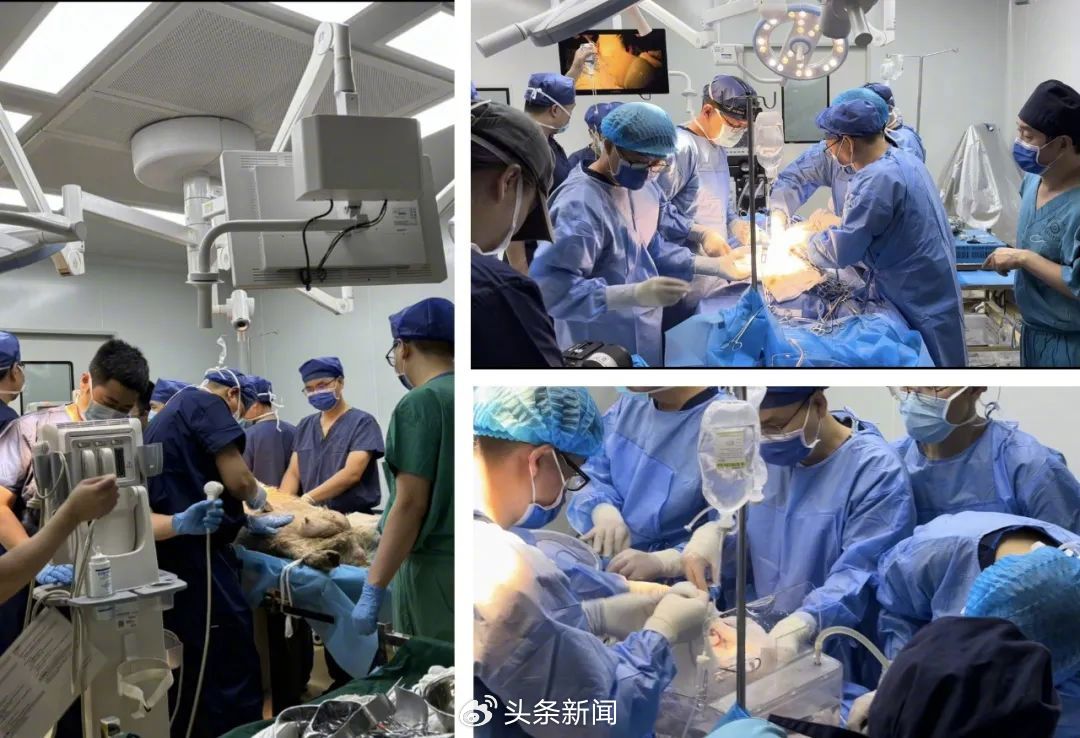
Zhengzhou University Hospital has successfully conducted the world's first experimental removal of ECMO from an artificial womb. A fetal lamb survived for 90 minutes outside the mother's body. The technology simulates the uterine environment and theoretically allows men to become pregnant. The core principle: the extracorporeal membrane oxygenation system replaces the placental function, providing oxygen and nutrients, and eliminating waste. In the experiment, early embryos developed well within the artificial womb. This technology brings new possibilities for future reproductive methods, but more research is needed to ensure its safety and effectiveness.
ScoresGreenland Sharks: Resisting Aging and Living Centuries
Greenland sharks live over 270 years, some possibly reaching 500. They swim deep in Arctic waters, moving slowly. Unlike other animals, their metabolisms do not slow with age. Ewan Camplisson, a biologist, found no metabolic decline in sharks aged 60 to 200.
These sharks mature late, at about 150 years, and live long in cold, deep waters with few predators. Camplisson suspects their slow growth and low mortality help them survive harsh Arctic conditions.
He plans to study their tissues to understand their anti-aging metabolisms. This research could help improve human health in old age.
ScoresRevisiting Freud's Work: A Fresh Analysis on Sexuality and Dreams
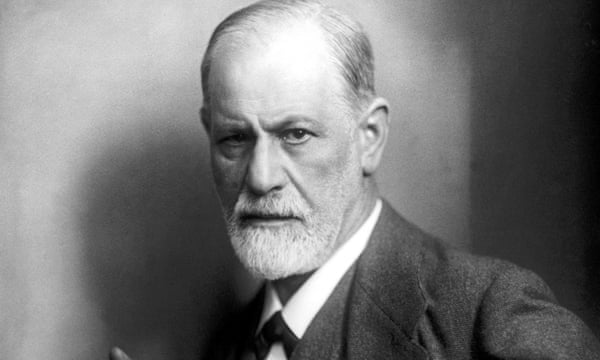
Freud's legacy, often tangled in sexual interpretations, gets a fresh look. Mark Solms, a South African psychoanalyst, revises Freud's "The Interpretation of Dreams." He argues Freud's broad view of sexuality—anything for pleasure, not just sex—was misunderstood.
Solms corrects old translations, updates outdated terms, and adds overlooked writings. He clarifies Freud's conservative nature, contrasting with the radical art his theories inspired. Freud aimed for order, not anarchy or sexual liberation.
The revised edition, a 24-volume set, releases at the Freud Museum in London. Solms preserves James Strachey's original translation, adding "subtle underlining" for updates. He hopes to reintroduce Freud's insights on dreams, despite resistance from those who wish to erase Freud from history.
Freud believed dreams keep us asleep by fulfilling wishes. Modern sleep research complicates this, showing dreams occur in various sleep states, not just during REM. Solms' work repositions Freud in the conversation about the sleeping mind.
ScoresMouth Bacteria Fusobacterium Found to Kill Certain Cancers

Scientists at Guy’s and St Thomas’ and King’s College London discovered that a common mouth bacteria, fusobacterium, can kill certain cancers. This bacteria, typically found in the mouth, surprised researchers with its cancer-killing ability.
In head and neck cancers, patients with fusobacterium within their tumors experienced better outcomes. The bacteria reduced cancer cell viability by 70%-99% in laboratory tests. Patients with this bacteria in their cancers had a 65% lower risk of death.
The researchers are now investigating how fusobacterium kills cancer cells. They conducted laboratory studies and analyzed data from 155 patients with head and neck cancer.
This discovery could pave the way for new treatments for head and neck cancer, which includes cancers of the mouth, throat, voice box, nose, and sinuses. Over the last 20 years, there have been few advances in treating these cancers.
Dr. Miguel Reis Ferreira, the study’s senior author, said they initially expected fusobacterium to worsen cancers or make them resistant to radiotherapy. Instead, it rapidly destroyed the cancer cells.
Dr. Anjali Chander, the lead author, described the findings as remarkable and surprising. Barbara Kasumu, executive director of Guy’s Cancer Charity, hailed the research as groundbreaking.
ScoresCRISPR Technology Applied to Treat Cobra Bites


CRISPR, a gene-editing tool, has found a new use: treating cobra bites. Snake bites kill nearly 140,000 people yearly and disable 400,000 more. Cobras, in particular, cause severe tissue damage and pain.
Standard treatment involves antivenom, but it's costly, needs refrigeration, and is specific to snake types. Nicholas Casewell and his team at Liverpool School of Tropical Medicine used CRISPR to identify human genes that react to cobra venom, leading to heparin, a drug already in use since the 1930s.
Heparin prevents blood clotting and could be a simpler, more effective treatment. The team plans clinical trials to test its efficacy in the field. If successful, heparin could be stored in rural areas, ready for immediate use.
Greg Neely, a coauthor, sees potential in using CRISPR to understand and counteract venom effects across different snakes. This approach could lead to broader treatments, saving more lives.
Scores